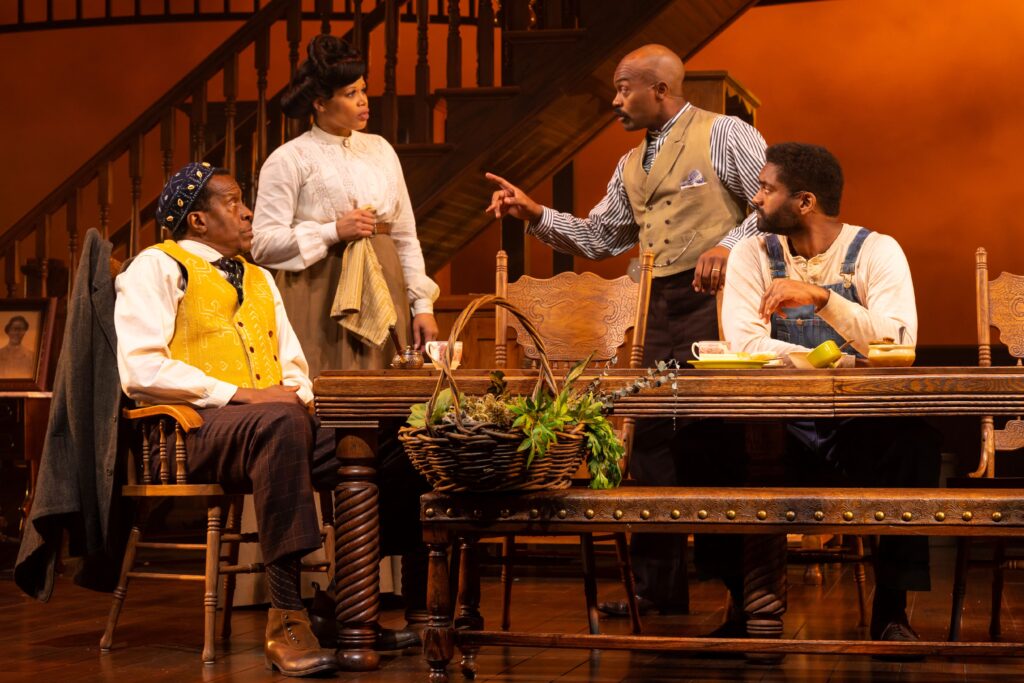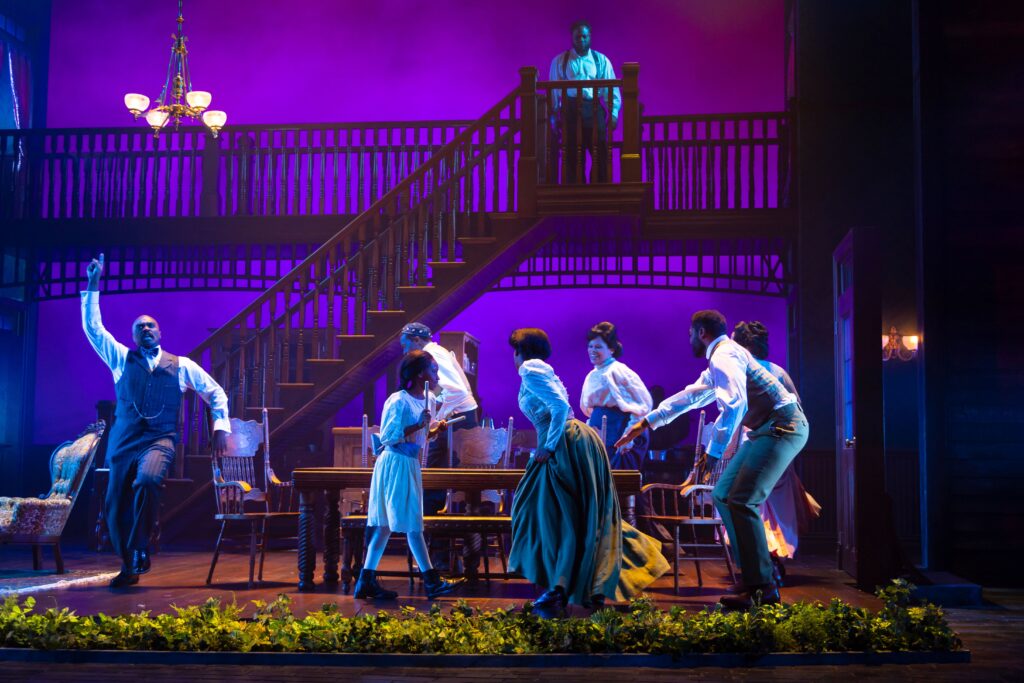
‘August Wilson’s Joe Turner’s Come and Gone’ by August Wilson. Directed by Lili-Anne Brown; Arnel Sancianco, Scenic Design; Samantha C. Jones, Costume Design; Jason Lynch, Lighting Design; Aubrey Dube, Sound Design. Presented by The Huntington Theatre, 264 Huntington Ave through November 13
by Mike Hoban
The road to recovery, a friend once told me, does not begin until we are broken. When we reach our bottom, that’s when the journey begins. August Wilson’s Joe Turner’s Come and Gone, now being presented by the Huntington Theatre Company, is jam-packed with broken people searching for a way to ease their pain. But with some guidance from a healer, some may find the path to a new life. Brilliantly acted, and infused with a surprising amount of genuine humor, Joe Turner takes us on a spiritual journey during the turn of the century (20th) in Pittsburgh, the setting for Wilson’s 10 play cycle chronicling the Black experience.

The production marks the return to the Huntington’s longtime home after a 900-plus day absence – due first to COVID, then to the $55 million historic renovation of the theater, which was built in 1925 as the first nonprofit theater building in the United States. Opening night included a dedication of the new lobby to Wilson, and featured appearances by Boston Mayor Michelle Wu and costume designer Constanza Romero Wilson, the playwright’s widow. The connection to Wilson runs deep, as the Huntington has produced all ten of his American Century Cycle plays, including a pre-Broadway co-production with Yale Rep of Joe Turner’s Come and Gone in 1986. The theater also produced his autobiographical one-man show in 2016, How I Learned What I Learned, which earned actor Eugene Lee an IRNE for Best Solo Performance.
Joe Turner is set in 1911 in a Pittsburgh boarding house run by Bertha (Shannon Lamb) and metal worker husband Seth Holly (Boston favorite Maurice Emmanuel Parent) during a time when newly freed African slaves are making their way north in search of a better life. The play tells a story of both disenfranchisement and healing, largely through the efforts of Bynum Walker (Robert Cornelius), longtime resident of the house, practitioner of ancient African folk magic, and dispenser of wisdom. Bynum is constantly but lovingly derided by the curmudgeonly Seth for his “mumbo jumbo nonsense,” but he’s also the constant among a house of transients, despite being on his own spiritual journey to find “the shiny man” that will enable him to find true peace in his soul.

The house is also home to boarder Jeremy (Stewart Evan Smith), a guitar-playing laborer who lives by the pleasure principle, but is all too aware of the blatant racism that can be inflicted by the local police after he is arrested and has his money stolen by them in an early scene. The relative tranquility of the boarding house is soon interrupted by the presence of new faces. Mattie (Al-nisa Petty), a young woman who has come to seek the help of Bynum to bring back the husband who has left her after the death of her babies, is immediately pounced upon by the lascivious Jeremy, and promptly moves in with him. There’s also Herald Loomis (James Ricardo Milord), a former preacher who, with young daughter in tow, is searching for the wife he lost contact with after spending seven years in forced labor at the hands of Joe Turner, a politically connected “businessman” who relies on chain gang labor. Loomis’ experiences have made him a changed man, with a downright menacing presence that has Seth on edge and the boarders frightened. But Bynum only sees a troubled spirit, and explains to Loomis that he needs to find his “song” (purpose and meaning in life) to ease his mind. ‘‘I see you a man who done forgot his song. Forgot how to sing it. A fellow forget that and he forget who he is,” he tells him. Bynum also connects him to “people finder” Rutherford Selig (Lewis D. Wheeler), a white peddler who buy the pots and pans Seth makes in his spare time.

While Loomis serves as the primary focus of the play, there are plenty of interconnected subplots that inform the audience of the reality of the Black experience decades after the conclusion of the Civil War, as well as the desperate need for connection among the boarding house residents. The production is buoyed by some terrific performances, led by Cornelius as the eccentric but wise healer, Bynum, presenting a believable God-consciousness even as is dispensing fantastical, folksy advice. Parent, one of Boston’s most consistently excellent dramatic actors, delivers an energetic comic performance (at one point sending Cornelius into an off-script laughing jag on opening night) as the crusty busybody Seth, who despite his overtly strong personality, answers to two entities – money and his wife Bertha, who lovingly keeps him on track.
As Bertha, Lamb is a sea of tranquility with an undertow of committed purpose in a wonderfully understated performance. Milord brings an intense presence to the role of Loomis, and is equally compelling when he breaks down following his trauma-induced hallucination. Smith brings a goofy charm to the character of the impulsive Jeremy, and Wheeler is convincing as the casually racist Selig. Arnel Sancianco’s multi-level set is simple yet elegant with a wooden staircase framed by an ever-changing backdrop that reflects the mood of the scene, and Samantha C. Jones costumes, particularly those worn by the women, are gorgeous.

Joe Turner is a welcome return home for the Huntington, and this production cements the theater’s long history with one of America’s most important playwrights. One drawback to the play on opening night was hearing the players, according to several (older) audience members, but hopefully the Huntington has straightened out the technical issue. For tickets and information, go to: https://www.huntingtontheatre.org/

